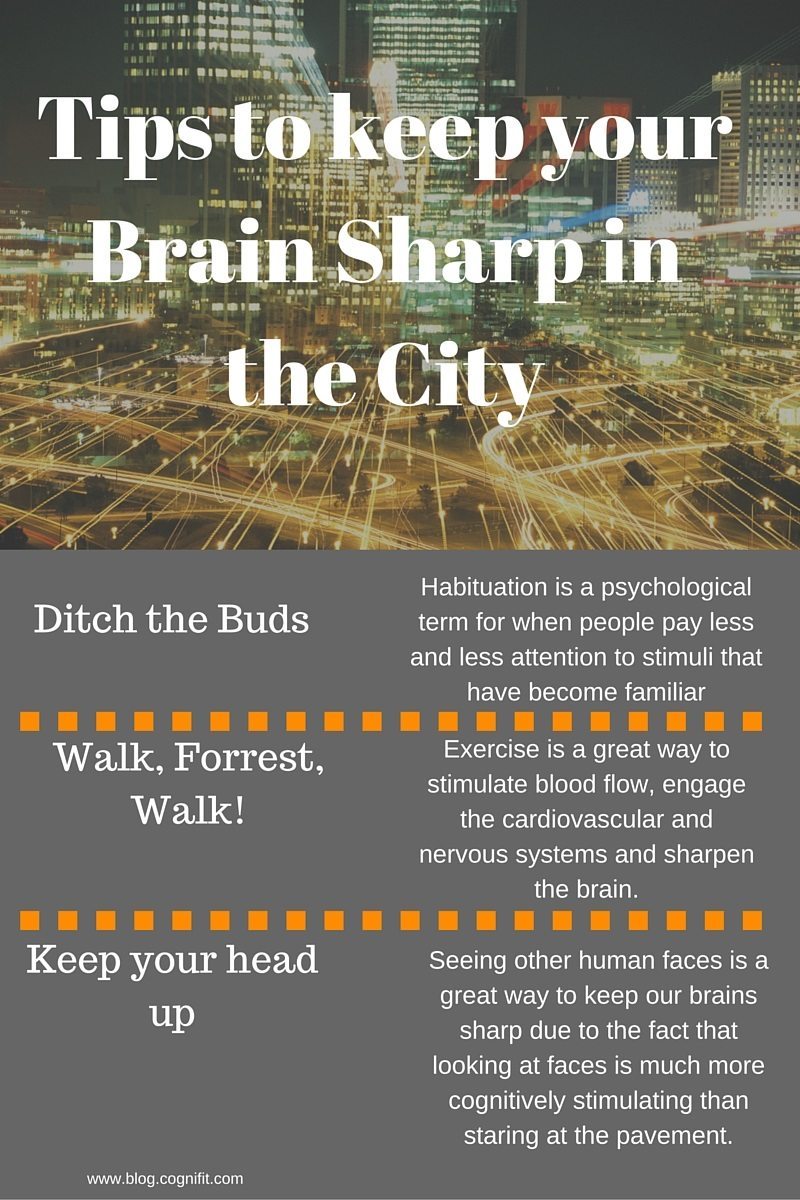
Tips to Keep Your Brain Sharp in the City

There are many easy ways for city dwellers to keep our brains sharp while on the go. Millions of people live and work in big cities and come in contact with a myriad of faces, sounds and smells on a daily basis. For people who are new to the city, their brains have a field day with all of the external stimuli. But for those of us who have gotten used to city life, we often forget to seek ways to keep our brains sharp when we are in the city.
By following these simple tips, you can help keep your brain sharp while traveling around in the city:
Ditch the Buds
Most city-dwellers become so accustomed to the sounds of the city that they experience something called “habituation.” Habituation is a psychological term for when people pay less and less attention to stimuli that have become familiar. Habituation has proven evolutionarily beneficial for many species of animals and it makes sense. Once we encounter a seemingly non-threatening stimulus countless times (like the sounds outside our apartments), we lose interest in that stimulus and shift our focus to new, potentially urgent stimuli. Yes, music does have positive cognitive effects. But if it ever feels like your learned habituation has sucked you into a routine of ignoring the world outside of your headphones or feeling bored when traveling around the city, leave them at home for a change!
The cognitive benefits of absorbing the surrounding sounds are plenty. Overstimulation of the ears, such as listening to loud music frequently, can lead to less sensitive eardrums. When we receive auditory input, it is processed in the temporal lobe (on the sides of the brain near the ears) and naturally, our ears’ sensitivity declines with age. But if you have a tendency to turn up the volume on the music coming in through your earbuds, you can prevent premature degradation of your eardrums by tuning into the outside world rather than your music every once in a while. Furthermore, the sounds around us can serve as a protective barrier; the whiz of oncoming traffic and the blares of car horns can warn us when we are crossing the street. Who knows? Perhaps by noticing your surroundings once more you might see or hear something that piques your interest, urges you to start a conversation or pleasantly keeps you wondering for the rest of the day.
Walk, Forrest, Walk!
Exercise is a great way to stimulate blood flow, engage the cardiovascular and nervous systems and sharpen the brain. Replacing the time that you stand or sit on public transportation with just a few added minutes of walking can help you feel more awake and more active. Moreover, walking is a convenient way to put the brain to work in ways you otherwise would not if you were stationary.
We all know that walking requires coordination. At a certain stage in our lives the activity becomes second-nature and almost automatic, but as we know from babies and toddlers, that was not always the case. Initially, for us to walk our brains had to learn to do so, which required our brains to make a series of neural connections in the process. Each time we walk we don’t even think about it, but our brains still do although the energy it takes is imperceptible to us. Whenever you can, plan ahead so that you can hop off of the bus four blocks early or get off of the subway one stop before you normally do. By choosing to do so, your body will burn more calories and your brain will fire more neurons.

Keep Your Head Up
A lot of people keep their eyes on the ground or gaze around randomly in efforts to avoid eye contact with other people. In fact, seeing other human faces is a great way to keep our brains sharp due to the fact that looking at faces is much more cognitively stimulating than staring at the pavement.
When we look at different faces, even if only for a moment, we activate the “facial recognition” region of the brain known as the “fusiform gyrus.” This area has been shown to play an important role in face recognition, as neurons in the region are excited when humans look at another face. With evolution, the benefits of brain excitation when we look at other humans has to do with the importance of our ancestors being able to recognize members of their families, communities and even their enemies. While it would be an unrealistic demand and daunting task to attempt to remember every face that passes you by, just by looking up rather than looking down you can give your brain a bit more of an exercise when walking amongst throngs of people.
In one of the world’s busiest, brightest and most populated cities, there are many ways for New Yorkers to keep our brains sharp while on the go. CogniFit’s online Brain Games offer exciting and effective ways to train your brain while on the go or at home. The Brain Games that CogniFit has created are scientifically validated and have been shown to actually improve and train brain cognition. Go ahead and try some of CogniFit’s unique and specialized Brain Games now.
The tips and exercises I mentioned are just a few ways to keep your brain sharp and put your neurons to work when moving around in a big city. No matter which city you may reside in, you can get more out of your everyday commutes by choosing to actively absorb the world around you.

References:
Gleitman, Henry, James Gross and Daniel Reisberg. Psychology. 8th ed. New York: W.W. Norton & Company, Inc., 2011. Print.
Jaffe, Eric. “About Face.” APS: Association for Psychological Science. Observer, February 2008. Web. 18 July 2016.












